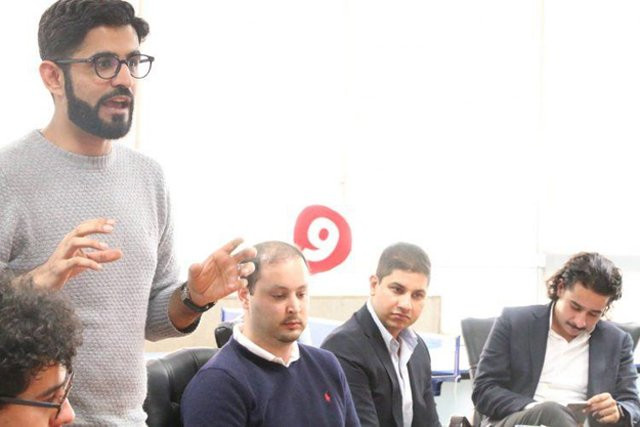A multi-million dollar seed fund syndicate is open for business in Pakistan
Sarmayacar recently poured US$200,000 into music streaming app Patari

Sarmayacar’s team. PHOTO: PUBLICITY
These players have seen beyond the mixed perception of the country and understand that it’s a rapidly-growing consumer market that’s adding over 1 million mobile broadband connections every month.
If this dynamic continues, the threat of a crowding-out effect is very real – as more foreign players enter Pakistan, local founders will be left fending for scraps. And the potential to scale is very much there – Uber says Pakistan is one of its top markets, while Rocket Internet recently centralized operations for several ecommerce markets in the southern port city of Karachi.
New programme in Pakistan aims to empower women through digital skills bootcamps
A few angel investors and some large conglomerates have set up dedicated tech funds, but that’s only leading to a faint trickle of investments at valuations that are heavily skewed in investors’ favor.
Hoping to address some of these issues is Sarmayacar, a recently launched seed fund syndicate. It comprises mainly expatriate Pakistanis working in the financial sectors of Singapore, London, and New York, as well as some of their friends and associates – a total of 14 people.
The brains behind this venture is Rabeel Warraich, who’s a vice president at private equity firm GIC Investment Management and based in London. Rabeel and the 13 other partners in the fund have pooled together their personal capital to help get it up and running. He’s reluctant to give a hard figure about how much cash Sarmayacar has at its disposal – but says it’s between “US$3 and 4 million.”
Off the ground
Sarmayacar made its first investment last month. It poured US$200,000 into music streaming app Patari, a Pakistani alternative to Spotify. Rabeel says the team’s actively looking for other startups to invest in and estimates they’ll make anywhere between six to ten investments in the year ahead.
These 5 startups are making it big by serving Muslims
At the same time he claims the size of the fund is likely to go up because there’s a lot of interest from other investors to join the crew. However, it will probably be capped at around 25 to 30 individuals and expected to close by the end of 2017.
A few of the investors are already based in Pakistan, says Rabeel, so they’ll be closely working with Sarmayacar’s portfolio companies – helping in strategy, networking, and opening doors. The CEO himself travels to the country every couple of months in an effort to keep meeting new entrepreneurs and building relationships with startup accelerators.
“We try not to be overly fixated on specific verticals as most verticals offer opportunities in Pakistan. We try to focus more on what problem is being addressed, what the fundamentals of the target market are and whether the business model of the startup will enable effective monetization of the opportunity,” outlines Rabeel when quizzed about his firm’s investment strategy.
Patari secures $200,000 in seed funding
“We are open to considering anywhere between US$50,000 and US$300,000 per investment, but our sweet spot is around US$200,000.”
Looking ahead
The eventual goal is to assist in funding requirements across all stages of the funding lifecycle. Right now the fund is sniffing out interesting opportunities, but as companies grow it’ll also aim to participate in series A rounds.
Rabeel’s confident that the profile of the fund’s founding team will help attract larger, institutional investors to Pakistan. However, when that happens, it’s likely to be under a different structure and with different limited partners on board.
“We are in this for the long run. Typical of investments of this nature, we expect at least a five-to-seven-year hold period for each investment,” he says.
The math whizz agrees there’s a severe dearth of existing capital but hastens to add that lots of foreign VCs are already making inquiries. Deal flow will help entice them even further and that’s something Sarmayacar will aim to support.
This article originally appeared on Tech in Asia



















COMMENTS
Comments are moderated and generally will be posted if they are on-topic and not abusive.
For more information, please see our Comments FAQ